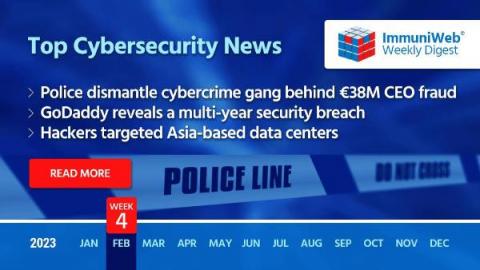Security | Threat Detection | Cyberattacks | DevSecOps | Compliance
Fraud
Deepfakes: What they are and tips to spot them
Deepfakes are forged images, audio, and videos that are created using Artificial Intelligence (AI), and Machine Learning technologies. According to the World Economic Forum (WEF), deepfake videos are increasing at an annual rate of 900%, and recent technological advances have made it easier to produce them. VMware states that two out of three defenders report that deepfakes were used as a part of an attack to influence operations, or to launch disinformation campaigns.
European Police Dismantle Cybercrime Gang Behind Euro38M CEO Fraud
Read also: GoDaddy reveals multi-year security breach, hackers targeted Asia-based data centers used by major global firms, and more.
Tanium on KABC-TV: Avoiding Romance Scams - Valentine's Day
Four of the Oldest Tricks in Scammers' Books
As the world grows increasingly digital and dependent on the internet, cyberthreats are constantly evolving to clash with newer and more rigid security features. Despite cybercriminals’ propensity for finding new and innovative ways to take advantage of their targets, however, there are also tactics that have been in use since the early days of the internet.
What are Apple Pay Scams and How to Avoid Them?
Did you know that Apple Pay has a $2500 apple cash card limit? If someone steals your credit card information from an online purchase, they can’t use it to buy over $2500 worth of goods. These card scams are getting common these days. Therefore, a company needs to go through PCI DSS penetration testing to have cyber security compliance.
A Guide on 5 Common LinkedIn Scams
The fact that scammers haunt Facebook and Twitter is not surprising. Even so, digital criminals don’t stop with just those two platforms. They’re also known to stalk users on LinkedIn where connections carry greater professional gravity. Fortunately, users can stay alert of such activity by familiarizing themselves with the most common types of LinkedIn scams. In no particular order, here are five such ruses that should be on everyone’s radar.
Valentines Day Dating Scams Warning
With Valentines Day being today, it’s important to look at the risk factors as well as celebrating the occasion. This time of year is the ultimate peak of online scams from catfishing to identity theft and many more. It’s crucial to be aware of these scams and how they are calculated. This blog & podcast covers the top common online dating scams and how to identify them.









